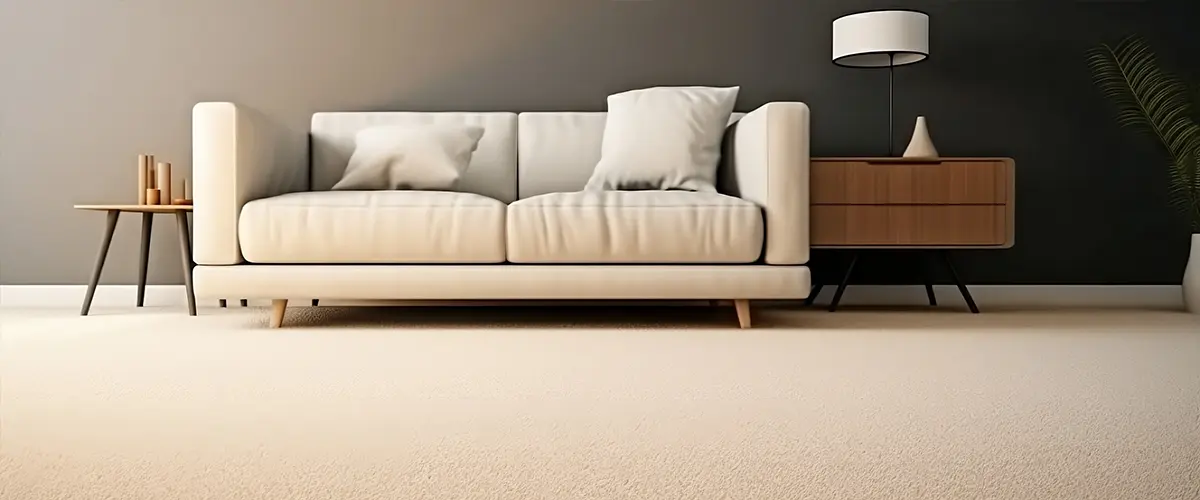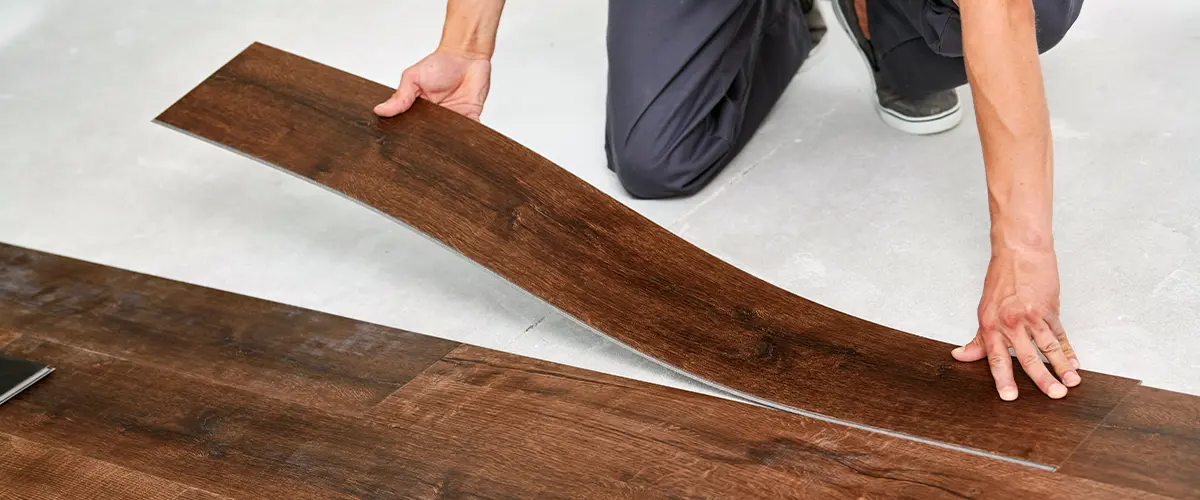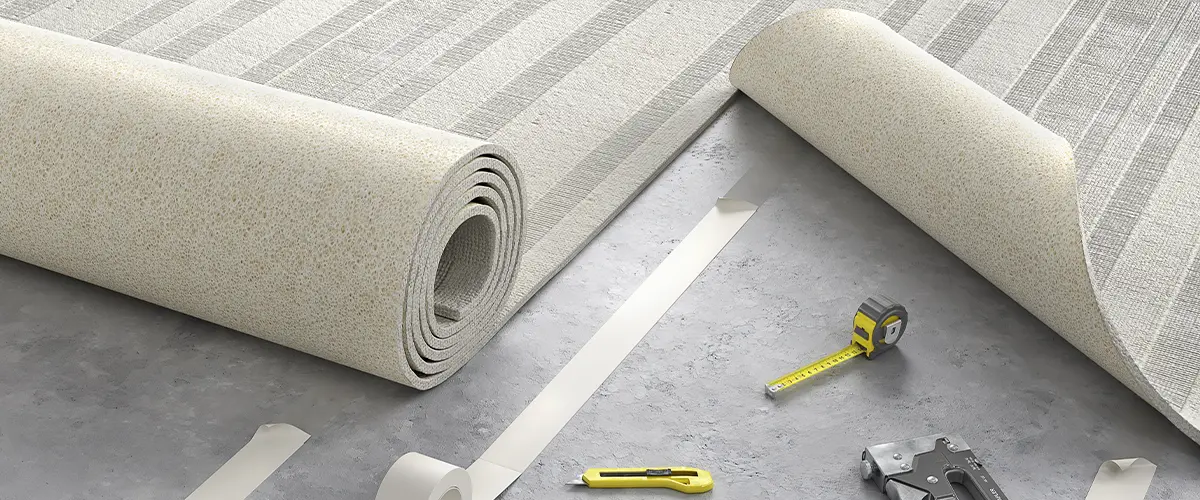Carpet Vs Vinyl Plank In Basement
Selecting the perfect flooring for your basement doesn’t have to be a daunting decision.
Whether you’re debating the cozy allure of carpet or the sleek durability of vinyl plank, this guide dives deep into each option, ensuring you have all the information needed to elevate your basement to the next level.
Let’s explore how both flooring types measure up in terms of style, comfort, and practicality, making your choice clearer and your basement transformation more exciting.
Keep reading to find out more!

Comparing LVT and Carpet for Basement Flooring
Look and Style
Choosing the right basement flooring involves considering both look and style. Luxury vinyl plank (LVP) offers a wide range of design options, including patterns that mimic natural wood or stone, giving your basement a modern and sophisticated appearance.
Its versatility allows homeowners to create unique spaces that reflect their personal taste without compromising on aesthetics.
Carpet, on the other hand, brings warmth and coziness to any basement setting. Available in various colors, textures, and styles, carpet can transform a cold basement into an inviting living space.
It adds an element of comfort underfoot which is especially appealing during colder months. Whichever option you choose greatly influences the vibe and functionality of your basement renovation project.
Applications
Homeowners often use carpet and vinyl plank in basements for different purposes. Carpet brings a warm, cozy feel to family rooms or bedrooms located in the basement, making it an inviting space during colder months.
On the other hand, vinyl plank suits areas prone to moisture or spills, such as home gyms, laundry rooms, and bathrooms. Its waterproof nature ensures durability against water damage.
Choosing between carpet vs vinyl plank in the basement depends on the room’s intended use and homeowner preferences. Both options offer a variety of styles and colors to match any decor theme seamlessly.
Next, we’ll explore cost considerations for both flooring types to help make an informed decision.
Cost
Choosing between carpet and vinyl plank flooring for your basement involves understanding their costs. Vinyl plank, especially luxury vinyl tile (LVT), can be more expensive initially than carpet.
The price of vinyl flooring varies depending on its quality, design, and the specific type you select, such as waterproof vinyl flooring or luxury vinyl flooring. On the other hand, carpet offers a wide range of prices based on the material it’s made from and its pile height.
Carpet tiles might provide a budget-friendly option without sacrificing style.
It’s essential to factor in installation costs alongside the price of materials. Installing luxury vinyl tile might cost more than laying down carpet tiles or rolls because it requires a perfectly smooth subfloor and precise cutting around room edges.
However, considering durability and maintenance expenses over time could make LVT a more cost-effective choice for some homeowners looking for long-term savings.
Carpet may need replacing sooner due to wear or moisture damage in basements susceptible to damp conditions.
Durability and Stability
Vinyl plank flooring is known for its durability and stability, making it an excellent choice for basements. Its hardwearing surface can withstand high traffic and resist scratches, dents, and stains.
Additionally, vinyl plank provides stability in changing temperatures and humidity levels commonly found in basement environments. This durability makes it a reliable option for long-term use in your basement without the need for frequent replacements or repairs.
On the other hand, carpet may not offer the same level of durability as vinyl plank. While it can provide some comfort underfoot, especially in living areas or playrooms within the basement, it may be more prone to wear and tear over time compared to vinyl plank.
Sound
When it comes to the sound, vinyl plank tends to be noisier than carpet. Vinyl planks can produce a hollow or clicking sound underfoot, especially if installed over an uneven subfloor.
On the other hand, carpet absorbs and dampens sound, making it a quieter option for basement spaces. For homeowners seeking a quieter ambiance in their basement, carpet may be the preferable choice.
In addition to its insulation properties for noise reduction, carpet provides excellent thermal insulation against cold floors in basements.
This combination of reduced noise and added warmth makes carpet a favorable choice for those looking to create a cozy atmosphere in their basement living areas.

Factors to Consider When Choosing Between LVT and Carpet for Basements
When choosing between LVT and carpet for basements, consider moisture and water resistance as well as ease of maintenance. Comfort and installation should also be taken into account when making your decision.
Moisture and Water Resistance
Vinyl plank flooring is highly recommended for basements due to its exceptional moisture and water resistance. It is impervious to water, preventing mold and mildew growth.
LVT’s waterproof properties make it an ideal choice, especially in areas susceptible to dampness or occasional flooding.
Homeowners can rest assured that vinyl planks are a durable solution for maintaining a dry and clean basement environment.
Carpet, on the other hand, may not be the best option as it absorbs moisture easily and can become a breeding ground for mold in high-humidity spaces like basements.
Additionally, if there’s ever a plumbing leak or flooding, carpeting can be significantly damaged and difficult to restore to its pre-flood condition.
Ease of Maintenance
Maintaining vinyl plank flooring in a basement is effortless, requiring only regular sweeping and occasional mopping with mild detergent. Its water-resistant nature makes cleaning spills a breeze, ensuring that the flooring stays pristine.
On the other hand, carpet demands more frequent vacuuming and deep cleaning to remove dust and dirt particles that accumulate easily.
When it comes to keeping your basement floor in top condition, ease of maintenance plays a significant role. Now let’s delve into the aspect of comfort when choosing between LVT and Carpet for Basements.
Comfort
Maintaining vinyl plank flooring in a basement is effortless, requiring only regular sweeping and occasional mopping with mild detergent. Its water-resistant nature makes cleaning spills a breeze, ensuring that the flooring stays pristine.
On the other hand, carpet demands more frequent vacuuming and deep cleaning to remove dust and dirt particles that accumulate easily.
When it comes to keeping your basement floor in top condition, ease of maintenance plays a significant role. Now let’s delve into the aspect of comfort when choosing between LVT and Carpet for Basements.
Installation
Now, let’s transition from the comfort of your basement flooring to the practical aspect of installation. When it comes to laying carpet in a basement, professional installation is advised due to potential moisture and temperature fluctuations.
For vinyl plank floors, they are often installed as floating floors, allowing for an easier and quicker process that may be suitable for DIY enthusiasts. Both options require a smooth and clean subfloor to ensure stability and longevity.
It’s important to consider hiring professionals or doing thorough research if you’re considering installing either type of flooring yourself.
The next step after choosing between carpet and vinyl plank is bringing the vision into reality by ensuring proper installation. Professional help should be sought when dealing with carpets, while vinyl planks offer an easier do-it-yourself approach with floating floor systems.

Special Considerations for Basements
Subflooring
The subflooring in your basement plays a crucial role in providing a stable foundation for your flooring choice. It serves as the base that supports and underpins the durability and stability of both carpet and vinyl plank.
Properly preparing the subfloor ensures that your chosen flooring will be able to withstand the everchanging conditions often found in basements, such as moisture or temperature fluctuations.
Quality subflooring can also help minimize potential issues like flooding or leaks, granting additional protection for your basement environment.
Basement Conditions (e.g. moisture, temperature)
Moisture and temperature in the basement are critical factors to consider when choosing between carpet and vinyl plank. Excess moisture can lead to mold and mildew growth, which is a concern for both flooring types.
Proper ventilation and dehumidification help maintain an ideal environment for your basement floors. Additionally, regulating the temperature in the basement is essential for preserving the integrity of both carpet and vinyl plank.
Both carpet and vinyl plank are sensitive to fluctuations in moisture levels. Keywords: moisture, temperature.
Potential Issues (e.g. flooding, leaks)
Flooding and leaks are significant concerns when choosing flooring for a basement. Vinyl plank is more water-resistant than carpet, making it better suited to handle potential flooding or leaks.
In the event of water damage, vinyl plank can be easier to clean and less likely to harbor mold compared to carpet. Regularly checking for any signs of moisture seepage and addressing them promptly helps prevent major issues.
Vinyl plank’s resistance to moisture also means that it is less likely to become damaged in the event of a minor flood or leak from plumbing fixtures.
This can save homeowners from having to replace their entire basement flooring in such instances, providing peace of mind while ensuring long-term cost savings related to potential water-related incidents.
Conclusion
Deciding between carpet and vinyl plank flooring for your basement is more than just a choice; it’s a reflection of your lifestyle, aesthetic, and the unique dynamics of your home.
As we’ve navigated through the considerations of moisture resistance, ease of maintenance, comfort, and installation, the journey brings us to a juncture where your personal preference takes the spotlight.
Whether you lean towards the warmth and comfort of carpet or the resilient elegance of vinyl plank, remember that your decision will pave the way for countless memories and experiences in the heart of your home.
As you contemplate your choice, consider not just the immediate impact but the long-term satisfaction and functionality of your space.
Whatever your decision, it’s clear that both paths lead to a more inviting, stylish, and practical basement ready to accommodate your family’s needs and aspirations.
FAQs
Discover Endless Possibilities with Mortise & Miter
Transform your basement with the expertise of Mortise & Miter. Our team is here to guide you through the maze of options, from the cozy elegance of carpet to the sleek durability of vinyl plank.
With personalized advice and a keen eye for design, we ensure your flooring choice not only meets your aesthetic desires but also your lifestyle needs.
Start your journey with Mortise & Miter today and step into a beautifully transformed space tomorrow. Contact us at (913) 214-6211.

